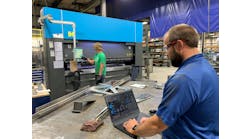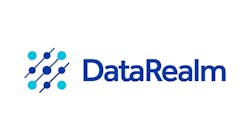Any lingering doubts about SAPs intentions in the MES space were dispelled in mid-June with the announcement that it is to acquire Visiprise, a Georgia, U.S.-based specialist in MES, planning and quality applications for discrete industries, including aerospace, electronics, automotive and medical-device manufacture.
The move must give pause to automation software vendors such as Rockwell, Siemens, GE-Fanuc and Invensys-Wonderware who have based their future strategy on the extension of their capabilities beyond the plant floor and into MES and the provision of off-the-shelf integration with the enterprise. Almost every automation and MES software vendor has some degree of cooperative agreement with SAP, but the Visiprise acquisition suggests that SAP sees these arrangements as no barrier to entering into direct competition with such partners wherever and whenever it chooses to do so.
While SAP has ERP modules that purport to support manufacturing functionality, it has long been recognized that they lack the real-time capability required directly to interact with and support plant-floor operations. Indeed, it was the very absence of that capability, not just from SAP, but from most other ERP offerings, which led to the development of the concept of an MES layer between the plant and the enterprise.
Colonizing the MES Space
Ever since the need for such a capability was identified, three classes of software vendor have been either actively attempting to colonize the space or eyeing it as a potential area for expansion. First have been start-ups, often involving individuals whose antecedents are with automation software vendors, and who have seen opportunities which those vendors have either failed to recognize or have been slow to exploit; second the automation vendors themselves, who see MES as providing the opportunity to sell additional applications into their existing customer base and, in the longer term, to tap into those customers IT, rather than operations budgets; and third, the ERP vendors whose move into and across the MES layer represents automation software vendors worst nightmare.
Ask any automation vendor any time in the last 10 years whether they were concerned at the prospect of SAP or any other ERP vendor moving down from the enterprise and towards the plant floor and they will have told you that those people simply dont understand the real-time world of manufacturing and dont wish to. In fact, however, SAPs intentions have been clear for some time, and its approach has been consistent.
First identify a vendor, usually a start-up, with an offering which provides it with a broad horizontal capability to extend its reach into the MES space and standardize the process of integrating the real-time world of operations with its own core offering; second, develop an increasingly close relationship with that vendor and provide practical and financial support further to develop its products in line with SAPs requirements; third, adopt and resell those products as SAP-approved or even SAP- branded offerings; and finally, acquire and absorb the vendor into the SAP family.
Lighthammer
First to be led through this process was Lighthammer, a relatively early spin-off from Wonderware whose manufacturing intelligence solution offered ISA95-compliant integration with the enterprise. Lighthammer was already a longstanding SAP partner when it was acquired, and its Collaborative Manufacturing Suite (CMS) has since been further developed and is now delivered as SAP MII (Manufacturing Integration and Intelligence).
Its also worth noting that its not just the product that SAP acquires in this process, but the expertise of the individuals involved. Comparatively few key personnel from the acquired companies seem to leave, and when they do, their destination may be more significant than if theyd stayed. Witness last years move of former Lighthammer CTO Rick Bullota and SAP vp of solutions management Sudipta Bhattacharya to Wonderware―or, in Bullotas case, back to Wonderware.
A year after the Lighthammer deal, SAP followed up with the 2006 acquisition of lean manufacturing specialist Factory Logic, whose own product offering has now become SAP LPO (Lean Planning and Operations) and whose team further enhanced its operations-level capabilities.
Meanwhile SAP was already developing its relationship with Visiprise, 70% of whose customers were already SAP customers, through investment in and endorsement and certification of its products. In June 2007, it began reselling and marketing the flagship Java-based Visiprise Manufacturing product, which integrates with SAP via SAP MII, as SAP Manufacturing Execution by Visiprise. Want to bet on that product re-emerging in the next few months as SAP ME? Commenting on the deal, Jim Hagemann Snabe of SAPs corporate office and a member of its executive council, said, The automation of business processes for manufacturing companies has been core to the SAP strategy for more than 30 years. We are excited to combine Visiprises industry-leading manufacturing execution solutions with the power of the SAP Business Suite. This combination will offer manufacturers better visibility by linking the operations of the plant floor to production planning and operations management, enabling manufacturers to respond profitably to the growing demands of their global customers.
Not much room for an automation vendors own MES offering there, then.
Consolidation
One consequence of this latest SAP move into MES, observers speculate, could be a race among both ERP and automation software vendors to snap up the remaining MES independents in a manner not dissimilar to what happened to PC-based SCADA vendors in the mid 1990s. Indeed that race already seems to be under way.
Back in April, Rockwell Automation announced its intention of acquiring Incuity, which has more in common with Lighthammer than the fact that its founders formerly had close associations with Wonderware. Meanwhile in February, Oracle announced that it was to use Kepwares KEPServer EX OPC server to deliver plant-floor data into its E-Business Suite. Automation vendors may have to reassess their MES strategies and determine whether it might not be better to invest their R&D dollars in ensuring they have the best in class their mainstream automation offering, instead of attempting to compete with the likes of SAP as they move the frontier of corporate IT from the upper to the lower boundary of the MES space.
SAP Now Gets It
Meantime, as ARCs Greg Gorbach and Bob Mick have noted, SAPs current moves only address the discrete side of the manufacturing coin, since Visiprise Manufacturing is not a product for continuous process industries. In their judgement, the evolving SAP now gets manufacturing. Rather than answer the question What is next? however, they prefer to save the speculation about SAP Operations Management for process industries for another day! Others, particularly those who have noted the close relationship between IPS and SAP on the development of InFusion, may be less cautious.



